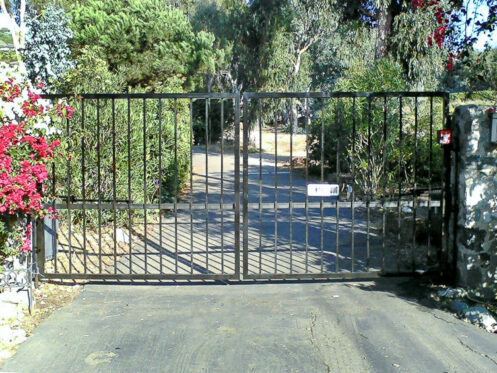Driveway gates add a special aesthetic to properties around southern California. However, they also serve as a needed safety and security device and deterrent. However, getting the best gate for your property can be a little confusing. Use this guide to learn about the varieties of gate construction and material and how to evaluate which is best for your home.
Gate Construction
Gates are not all made the same but come in various construction types. Each type available provides different benefits ranging from security to ease of installation and operation.
Sliding Gates
Sliding gates slide out and back from the attached fence. One of the major benefits of this gate style is that it doesn’t require the amount of space needed compared to a gate that swings. The way they’re constructed makes them sturdy and difficult to force open because of their horizontal movement and the track the gate slides on.
Swing Gates
Swing gates open by swinging out or in from the hinge. Most driveways are wide enough to necessitate a split swing where the gate is two pieces and each swing open to allow access to the property. One of the challenges faced with swinging gates is the space they require to open. Whether the gate swings out or in, there must be enough room on the opening side of the gate for the length of the gate door. However, swing gates are often considered to produce more curb appeal because they don’t look as industrial as many sliding gates do. Swing gates can come in a variety of options, including solid designs that offer more privacy but also more artistic options like unique wrought iron designs.
Bi-Fold Gates
Bi-fold gates offer some of the same benefits as swing gates but aim to solve the space issue. Rather than swinging the length of the entire gate, bi-folds have another hinge about halfway between the end of the gate and the end hinge. Depending on the gate size, this can allow a single motor to operate an entire gate allowing it to fold rather than swing two independent halves open.
These kinds of gates typically open faster than other options, usually 3 to 7 seconds compared to most swing or sliding gates. They are trackless, so they require less maintenance than sliding options.
Automatic Gates
Most people think about automatic gates that are opened by a swing motor or a chain, but manual options are available for those who prefer physical locks. Automatic gates come with a variety of integrated access control mechanisms to gain access to the property, including keypads, RFID, remote control and smart access systems.
Gate Material
Beyond construction type, material is a major factor affecting the look, function, and cost of a gate. The most common materials include wood, metal, vinyl and composite.
Metal Gates
Metal gates are among the most popular for property owners concerned about security. Metal is very durable to both intentional damage and natural elements, making it ideal for offering reliable security. Metal gates are low maintenance, taking years to corrode and requiring little work to keep them looking good and functioning well. There are many design options with metal, allowing the property owner to bring an artistic flair to what could otherwise be a mundane part of the house. The challenge of metal is that it’s often more expensive to install than other options. Common metal options include steel, wrought iron, cast iron and aluminum.
Wood Gates
Wood is a beautiful option, bringing a natural aesthetic to the front of the property. These are especially appealing if you live in a well-landscaped area and want to embrace the natural tone. Wood is also easy to repair if it’s damaged, often allowing you to replace a portion of the gate rather than the entire thing, depending on its design. On the opposite side of that coin, wood is more easily damaged and worn in normal weather. It also requires more frequent maintenance than other options to keep it sealed and to protect it from the elements. Wood also offers a lot of versatility in the gate construction with designs ranging from solid privacy to slat wood and many options in between.
Vinyl Gates
Vinyl gates are made from a similar material to the siding installed on some homes. Property owners who gravitate toward vinyl are often more concerned about privacy than hardened security. They also appreciate the relative minimal maintenance and the environmental resistance, as vinyl often suffers less damage from normal weather and insects than wood alternatives. Vinyl can be more expensive than wood gates to install and may fade and crack from UV exposure if the vinyl isn’t a high enough quality. It’s also more susceptible to extreme weather events like hail or fire.
Composite Gates
Composite material is material that’s a blend of synthetic material, natural fibers like wood, and binders. Composite material looks similar to wood but often makes maintenance easier and is stronger than vinyl options. They often have a longer life than wood gates because of their resistance to weather and insects. Composite is often more expensive than wood alone and can warp in extreme heat, either solar heat or from fires. They are also more expensive to install than standard wood because they use metal reinforcement and require more installation labor than other options.
What’s Best for Your Home?
Now that you have an idea of the breadth of options, how do you choose the best one for your home? Three factors will generally affect that choice, including safety and security, climate and your budget.
Safety and Security
Most people who want a driveway gate want an increased sense of safety, security and privacy. Work through your security and privacy goals with your installer to determine the options. If privacy is your major concern, a vinyl or wood gate may be a good option. However, if you want the best protection against someone forcing their way through your gate, nothing can beat a metal gate, but that comes with an increased cost.
Climate
Consider the environment around your home. Are you at high risk of the notorious southern California wildfires or the blistering Santa Ana winds? You may want to steer clear of vinyl and composite gate options. However, if you’re closer to the coast or are in a neighborhood that isn’t at as much risk, composite or vinyl may be a solid option.
Budget
Ultimately, consider the cost of installation balanced with your goals and combined with the return on your property value. Real estate estimates suggest you can expect about a 53% return on the investment of a driveway gate. So, if you invest $10,000 in a new automatic driveway gate, you can expect a return of about $5,300 in your home’s property value.
Property owners around San Diego trust ADS Automatic Door Specialists to help keep their properties safe and secure. Our team specializes in gate repair and driveway gate installation, garage door installation, maintenance and repair, garage door openers and garage door springs. Call to schedule a consultation with one of our award-winning gate experts to explore which gate is right for your home.


